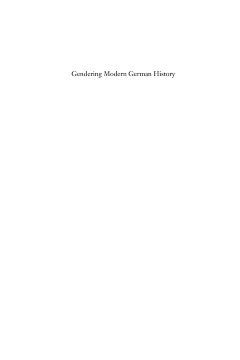
Additional Information
Book Details
Abstract
Writing on the history of German women has - like women's history elsewhere - undergone remarkable expansion and change since it began in the late 1960s. Today Women's history still continues to flourish alongside gender history but the focus of research has increasingly shifted from women to gender. This shift has made it possible to make men and masculinity objects of historical research too. After more than thirty years of research, it is time for a critical stocktaking of the "gendering" of the historiography on nineteenth and twentieth century Germany. To provide a critical overview in a comparative German-American perspective is the main aim of this volume, which brings together leading experts from both sides of the Atlantic. They discuss in their essays the state of historiography and reflect on problems of theory and methodology. Through compelling case studies, focusing on the nation and nationalism, military and war, colonialism, politics and protest, class and citizenship, religion, Jewish and non-Jewish Germans, the Holocaust, the body and sexuality and the family, this volume demonstrates the extraordinary power of the gender perspective to challenge existing interpretations and rewrite mainstream arguments.
Jean H. Quataert is Professor of German History and Women's Studies at Binghamton University, SUNY. She teaches human rights history and global women's history on the undergraduate level and, for graduate students, specialized courses in German history in the context of Germany's place in Europe and the globalizing world.
Karen Hagemann is the James G. Kenan Distinguished Professor of History at the Department of History of the University of North Carolina at Chapel Hill and teaches Modern German and European History and Gender History. She also held prestigious fellowships/visiting professorships in Uppsala, Princeton, Toronto and Trier. Her main fields of publication are the history of welfare states, labor culture and women's movements, as well as the history of the nation, the military, and war.
“…a useful guide to major research trends on women and gender in modern German history.A structured bibliography compiled by the two editors is also very helpful, since it contains most major publications in the field, both articles and monographs, mostly in English. It also needs to be said that most contributors, regardless of where they come from, pay equal attention to historiographical developments on both sides of the Atlantic.” · European History Quarterly
“Together, the essays in this volume provide an eloquent and useful overview of nineteenth- and twentieth-century German women's and gender history. Scholars of Germany, comparative gender historians, and non-specialists will find here rich essays on German history, gender, and sexuality.” · H-German
”…the overall design of the volume deftly balances several important goals. It presents a comprehensive literature review of gender research in a variety of subfields, evaluates the position of women historians in the profession, examines open and disputed question, and proposes criteria for further research. Overall, it is an essential volume for those who are interested in how German history as a whole has become increasingly influenced by the once-marginal subfield of womens’ and gender history.” · German Studies Review
“This book offers a good introduction to anyone who wants to find out quickly about the state of gender history research in [many] areas…The detailed bibliographies and the index are extremely helpful in allowing rapid access to the literature presented.” · Bulletin of the German Historical Institute London
"... this pioneering work has deepened understanding and what avenues await further exploration. Ten essays, each with extensive citations, by prominent German and US scholars consider significant themes in German history ... A clearly organized 'selected bibliography' adds to its importance for students and scholars interested in this path-breaking shift toward a more balanced understanding of Germany's history…Highly recommended." · Choice
A wonderful compendium, perfect for classroom use - and a terrific resource for scholars. The essays provide valuable original perspectives on some of the most significant controversies currently engaging historians of Germany, as they also document just how profoundly careful attention to questions of gender has infused and transformed many subfields in German history - including the study of religion, political protest, war, and colonialism. · Dagmar Herzog, Graduate Center, City University of New York
Authors take on the big themes and debates of German history, providing unparalleled evidence -- including extensive footnotes and a bibliographical chapter -- that gender has not only challenged mainstream ('malestream') German history but has in many cases, indeed, rewritten it. This rich and thought-provoking book is a 'must' for scholars and students concerned with historiographical debates, the transatlantic dialogue among scholars, and issues of theory and methodology. It will also attract a public interested in gender history and is intrigued by the effects of gender more generally. · Marion Kaplan, New York University
This incisive collection of essays details the impact of a focus on women and gender on historical writing on modern Germany. Attuned to developments in the United States and Germany, the essays carefully distinguish points of convergence and divergence in approach and methodology between the two academic cultures and provide a nuanced overview of the current state of the field as well as desiderata for the future. Leading scholars illuminate how gendered perspectives have revolutionized understanding of the conventional stuff of history — such as nation, politics, military, religion, and the state — while opening up critical new avenues of analysis around citizenship, family, sexuality, colonialism, minority relations, and memory. An invaluable resource for students and scholars of German history and gender studies alike. · Heide Fehrenbach, Northern Illinois University
